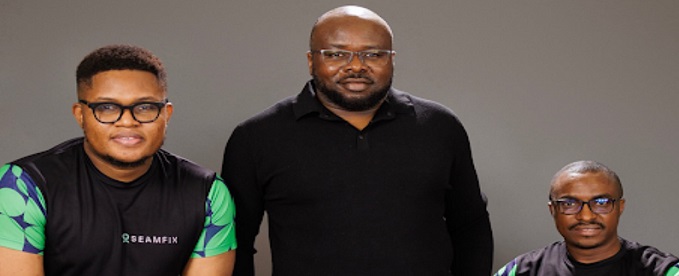Telecom
Seamfix, Digital ID Solutions Provider Secures $4.5m Funding

Seamfix, a global digital identity solutions provider, has secured $4.5 million from Alitheia IDF, a gender lens investing fund, in a private equity funding round.

Seamfix executives
The firm plans to use the new capital injection to scale its technology infrastructure that underpins its solutions, improve data flow crucial for continental trade and integration, and kickstart the expansion of its digital ID and credential services into five new African countries.
“We are thrilled to announce this new funding, which marks a significant milestone in our journey of shaping the future of digital ID verification in Africa and connecting Africa to the rest of the world.” Chimezie Emewulu, group CEO, and co-founder of Seamfix, said.
”Digital identity is a right – not a privilege – and this belief underpins our innovation and commitment to enabling individuals and businesses in Africa to access all the benefits that come with having verifiable identities. This investment not only validates our vision but also empowers us to expand our reach and innovate further.”
Starting in Nigeria, Seamfix provides identity creation, verification and transaction accreditation solutions for large organisations and government agencies across multiple African countries.
The new funding represents Seamfix’s first institutional investment, and it will enable the company to expand its services to Ghana, Kenya, South Africa, Ethiopia, and Uganda.
Digital ID and verification systems are crucial to unlocking significant economic value across Africa’s growing and increasingly digital societies.
From financial participation and efficiency in government services to public health and job creation, digital ID and verification systems are a fundamental driver of economic growth on the continent. A recent report suggested that African countries that implement effective digital ID systems can boost their GDP by up to 13 percent.
Since the company was founded by Chimezie Emewulu and Chibuzor Onwurah, Seamfix has been at the cutting edge of delivering end-to-end digital ID and credentials solutions for connecting businesses and individuals to the disparate identity databases in Africa and across the world.
The company has delivered a wide range of solutions for organizations such as Veremark, Nigeria’s National Identity Management Commission [NIMC], telcos (MTN, Glo, Airtel and 9 Mobile), financial institutions (United Bank for Africa, Interswitch and Union Bank) and more, enabling them and their customers globally to seamlessly create, verify and access trusted digital identities and services.
Seamfix’s key achievements include the successful development of a digital solution enabling widespread access to National Identification Numbers (NINs) for more than 100 million Nigerians.
Seamfix also supported Nigerian telecommunications services providers, to register and verify a database of over 200 million Subscriber Identification Modules (SIMs) to comply with Nigerian Communications Commission regulations.
Seamfix currently works with major telcos across Africa (Nigeria, Côte D’Ivoire, Liberia, Sudan, Guinea-Bissau and more) on their SIM registration, verification and linkage to national identities. Thousands of fintechs and SMEs rely on Seamfix’s verification APIs for KYC checks during customer onboarding and employee background checks.
Seamfix’s digital credential platform has also transformed the credential issuance and certification process for multiple universities across Africa, powering them to issue instantly verifiable credentials and transforming the process of certifying credentials such as student transcripts and other official documents from over 6 months to a matter of days.
This transformation has also been responsible for more than 2,000 per cent growth in internally generated revenue at these universities.
Telecom
Abia Set to Regulate Right of Way for Telecom Cables

Abia State Government said it was set to regulate the right of way for laying of telecommunications cables around the state. This is as the state government said it will re-base and update the 30 – year development plan of the state to bring it in line with present realities.

The Commissioner for Information, Prince Okey Kanu disclosed these in Government House Umuahia, while briefing journalists on the outcome of the first State Executive Council meeting of the year.
Kanu explained that re-basing has become imperative given the economic headwinds prevalent in the country and as typified by the headline
inflation being experienced in the country today.
The Commissioner noted that there was need to carry out the exercise to reflect the real position of the state’s economy.
He informed that the state economic team charged with the assignment was already at work to ensure the success of the exercise.
“The final document for the right of way regulation for laying of telecom cables around the state has been produced and this will come into effect very soon.
“That is meant to regulate how telecommunications cables are laid across the state,” Kanu said.
Kanu disclosed that Government has concluded plans to rejig the enforcement of the existing traffic rules in the state as a way of restoring sanity in the transport system of the state
He said EXCO observed with dismay that driving against traffic in the state has become a menace and stated the Alex Otti administration was committed to enforcing the traffic rules.
“Going forward, it will be a serious offence to drive against traffic no matter the distance. You see a lot of people within the town drive against the traffic for one reason or the other.
“It is now a very serious offence and the harmonized taskforce has been rejigged to ensure full compliance to that policy.”
Kanu informed that the state government has commenced the payment of monthly stipends that range between N250,000 to N450,000 to traditional rulers in the state.
Telecom
MTN Nigeria Achieves Historic CMS Certification

MTN Nigeria has achieved a major milestone by becoming the first Nigerian organisation, the first company in the telecommunications industry, and the first within MTN Group to earn the Compliance Management System (CMS) certification from the International Accreditation Service (IAS).

This globally recognised certification affirms MTN Nigeria’s commitment to maintaining world-class compliance standards across its diverse operations.
It covers all management activities related to telecommunications, digital services, mobile voice and data, innovative digital platforms, wholesale distribution, fixed and mobile broadband connectivity, and advanced technology solutions for corporate and institutional clients across the nation.
Commenting on the achievement, MTN Nigeria’s Chief Risk & Compliance Officer, Obiageli Ugboma, said, “Achieving this feat is a testament to our robust compliance framework and proactive approach to managing risks in an ever-changing digital landscape.
“It reinforces our promise to connect Nigerians with secure, reliable, and innovative solutions.”
The International Accreditation Service (IAS) is a globally recognised accreditation body. It accredits a wide range of organisations, including governmental entities, commercial businesses, and professional associations, based on recognised national and international standards.
This ensures that IAS accreditations are both domestically and globally accepted, highlighting their credibility and relevance.
The ISO 37301:2021 Compliance Management System (CMS) standard is the benchmark for effective compliance management.
The certification solidifies stakeholder trust and provides organisations with a framework for establishing, implementing, evaluating, and continually improving a compliance management system that ensures adherence to laws, regulations, and ethical standards.
By achieving this certification, MTN Nigeria demonstrates its commitment to fostering a culture of integrity, mitigating risks, and enhancing corporate governance and operational efficiency.
This achievement positions MTN Nigeria as a leader in compliance management and sets a benchmark for excellence within the telecommunications industry and beyond.
Telecom
Sub-Saharan Africa Lost $1.56Bn to Internet Shutdown in 2024 – Report

Sub-Saharan African countries lost $1.56 billion to government-induced shutdowns in 2024, according to a new report by Top10vpn, an international VPN review website.

This is 19 per cent of the total $7.69 billion that was lost to Internet shutdowns worldwide and a 10 per cent decline from $1.74 billion reported in 2023.
According to the report, there were a total of 28 Internet shutdowns across 28 countries. Thirteen of these were African countries — Sudan, Ethiopia, Kenya, Algeria, Guinea, Mauritania, Senegal, Mozambique, Chad, Mauritius, Tanzania, Papua New Guinea, and Equatorial Guinea.
It revealed that Nigeria stood out as one of the few sub-Saharan African countries to avoid internet shutdowns in 2024.
Experts said the absence of an internet shutdown suggests that people in that country have continuous and unrestricted access to the internet, allowing them to communicate, access information, and participate in online activities without disruption imposed by the government.
Sudan is the African country that lost the most — $1.12 billion — to Internet shutdowns. Total Internet shutdowns in the country lasted for more than 12,707 hours or over 529 days.
The Internet shutdown in Sudan is mainly due to a prolonged conflict in the country, which has claimed 13,000 and displaced more than 10 million people.
Other African countries like Kenya and Ethiopia shut down the Internet because of protests.
Both countries lost $75 million and $211 million to Internet shutdowns, respectively.
Major platforms such as X, TikTok, Signal, Facebook, Instagram, and WhatsApp were restricted, affecting approximately 111.2 million internet users in the country.
“In late February 2024, authorities in Myanmar once again started blocking access to X. As this was a new restriction. This is also the second year we have included blocks of newer social media platforms, such as TikTok and Telegram,” it said.
Globally, Asia led in terms of internet shutdowns in 2024, losing $4.64 billion over 48,807 hours of disruptions affecting 331.3 million people. Sub-Saharan Africa followed with $1.5 billion in losses spread over 32,938 hours and impacting 111.2 million internet users.
While the global economic impact of internet shutdowns decreased by 16 percent compared to 2024, the duration of shutdowns increased by 12 per cent in the same period.
The report emphasised the damaging effects of internet shutdowns, both in terms of economic and human costs, and highlighted concerns about citizens resorting to unsafe VPNs to circumvent imposed restrictions.

 Telecom2 days ago
Telecom2 days agoSuspected Lakurawa Terrorists Kill 3 Telcoms Workers in Kebbi

 General News2 days ago
General News2 days agoLagos State Sets Strict Deadline for 2024 Tax Returns Filing

 News2 days ago
News2 days agoSERAP Drags FG, Govs to ECOWAS Court over ‘Misuse of Cybercrimes Act’

 E-Financial2 days ago
E-Financial2 days agoBudgIT Queries Irregularities in FG’s Proposed 2025 Budget

 E-Financial2 days ago
E-Financial2 days agoNAICOM Seeks Police’s Support to Enforce Third-party Motor Insurance

 E-Business2 days ago
E-Business2 days agoLagos, NIPOST Partner to Transform e-Commerce Delivery

 E-Financial2 days ago
E-Financial2 days agoGAIM 6: Fidelity Bank Rewards 10 Customers with N10m

 Telecom1 day ago
Telecom1 day agoUSSD Dispute: FG May Blacklist 18 Banks Allegedly Owing Telcos N250Bn



























